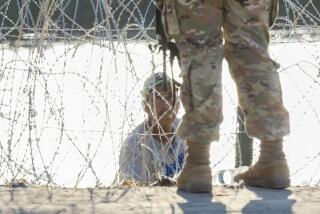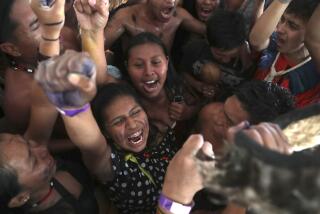In win for Duterte, Philippine Supreme Court permits heroâs burial for former dictator Ferdinand Marcos
Reporting from Beijing â The Philippine Supreme Court on Tuesday approved the burial of former dictator Ferdinand Marcos at a heroesâ graveyard, in a case that has resurrected a traumatic period of the countryâs history and could redefine the legacy of a brutal leader.
The decision is a significant win for Philippine President Rodrigo Duterte, who pushed to transfer Marcosâ remains from his home province of Ilocos Norte, where they lie on display in a glass coffin.
Duterte argued the two-decade ruler deserved burial in the Heroesâ Cemetery ânot because he was a hero, but because he was a Filipino soldier.â
Marcos, whose government is believed to have killed thousands, tortured countless more and plundered up to $10 billion from state coffers, was ousted by a âPeople Powerâ uprising in 1986. Heâs remained unburied since his death three years later.
The Supreme Court ruled 9-5 to dismiss petitions that opposed Duterteâs attempt to move the remains, ending a debate that has torn the country for nearly three decades. The justices determined the president had acted within his legal rights in making the decision.
Hundreds crowded around the courthouse Tuesday, waving flags and banners as the decision stretched into the afternoon. Some wept when they heard the news; others screamed. Human rights activists who brought the petitions insisted they would ask the court to reconsider.
âWe are disappointed. We are heartbroken. We are outraged,â said a coalition of groups opposed to the burial, in a joint response. âThe very definition of hero is now in question.â
The presidential spokesmanâs office released a statement shortly after the ruling acknowledging the court as the âfinal arbiter of all legal questionsâ and expressing hope âthe matter would finally be laid to rest.â
But vice president and human rights lawyer Leni Robredo, in her own statement, warned the burial decision would âkeep the wounds of the past unhealed.â
Solicitor General Jose Calida, the governmentâs lawyer in the case, has framed the burial as an opportunity for national healing. He told the Supreme Court that it would allow the country to âexorcise the ghost of enmity and bitterness that prevent us from moving forward.â
Ferdinand Marcos Jr., Marcosâ son and a former senator, echoed that sentiment Tuesday in comments that also praised Duterte and the court for âa magnanimous act to uphold the rule of law.â
The Marcos family has tried to transfer his remains to the military-owned graveyard since Marcosâ widow returned with them in 1993. Marcos died while in exile in Hawaii.
But Filipinos who suffered under his rule abhor the thought of Marcos commemorated at the Philippine equivalent of Arlington National Cemetery, which holds people âworthy of emulation.â
Marcos led a guerrilla unit against occupying Japanese troops, but the National Historical Commission has blasted his war record as one âfraught with myths, factual inconsistencies and lies.â
Some consider the ruling a sign of public complacency about the Marcos legacy, as generations age and memories fade.
His wife, Imelda Marcos, who famously left behind more than 1,000 pairs of shoes when her husband was ousted, is a congresswoman. His daughter is the governor of his home province and his son nearly won the vice presidency this year.
We’re essentially entering a new meta-narrative where Marcos is treated like any other president.
— Richard Javad Heydarian, assistant professor of political science, De La Salle University
âWeâre essentially entering a new meta-narrative where Marcos is treated like any other president,â said Richard Javad Heydarian, assistant professor of political science at Manilaâs De La Salle University.
âThis shows the failure of previous of administrations to inculcate a proper understanding of Marcos, and a failure to deliver on promises they have made after Marcos on peace and prosperity,â he said. âTo blame Duterte on this is quite unfair.â
Others insist Duterte should take the full blame. They point to his ties with the Marcos family and question whether financial motivations influenced his decision to relocate the remains. Duterte has said he received a campaign contribution from Marcosâ daughter, although she denies it.
Duterte has shouldered some of the countryâs most controversial issues since he took office four months ago. Heâs picked a fight with the U.S., reached out to China and launched a bloody drug war. This issue is no exception.
But his deference to the Supreme Court on the matter, analysts contend, is crucial.
âThis was due process, not railroaded,â said Eduardo Araral, vice dean of research and associate professor at the National University of Singaporeâs Lee Kuan Yew School of Public Policy.
âAs a democratic country, the Philippines will have to accept the decision and move on.â
Meyers is a special correspondent.
ALSO
Mexico is feeling jitters over the prospect of a Trump victory
UPDATES:
2:10 a.m., Nov. 8: This article was updated with reaction on the ruling.
This article was originally published Nov. 7 at 11:10 p.m.
More to Read
Sign up for Essential California
The most important California stories and recommendations in your inbox every morning.
You may occasionally receive promotional content from the Los Angeles Times.









